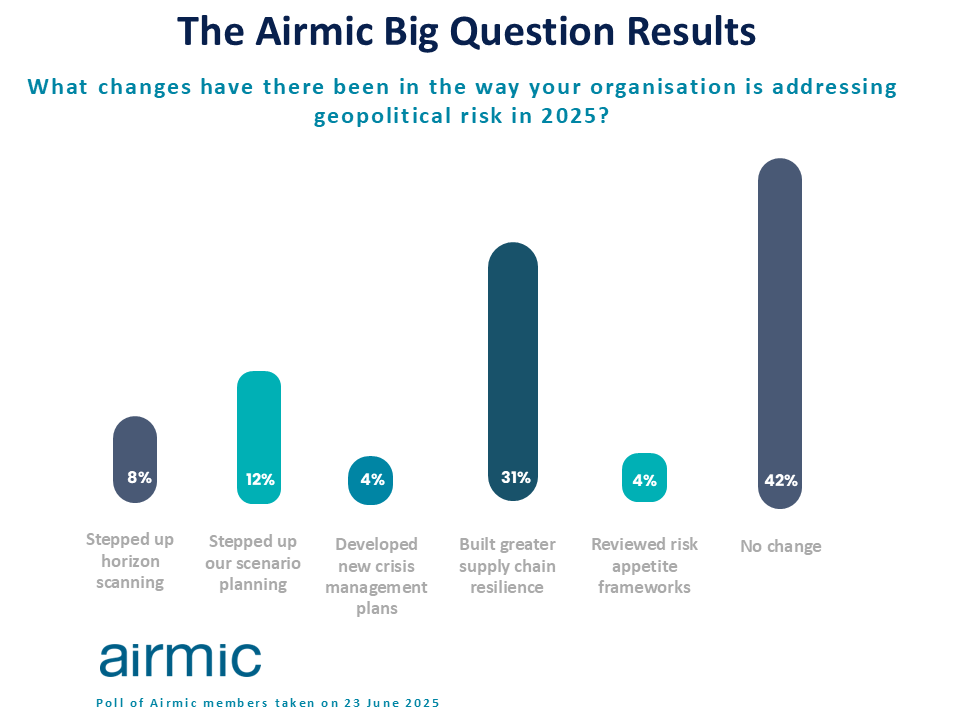GEOPOLITICAL RISK: AIRMIC MEMBERS ARE FOCUSED ON BUILDING SUPPLY CHAIN RESILIENCE
Transit chokepoints such as Strait of Hormuz a concern arising from Middle East conflict.
Risk professionals are focusing on building supply chain resilience in their organisations as a means of addressing geopolitical risk this year, while most respondents in this week’s Airmic Big Question said there had been no change in the way their organisation is addressing such risk.
This comes as geopolitics especially in the Middle East has become more dynamic than ever. Last month, Iran had threatened to close the Strait of Hormuz with implications for global supply chains, and then launched missiles at a US airbase in Qatar. The US president then announced a ceasefire between Israel and Iran after two weeks of hostilities between the two countries.

Julia Graham, CEO of Airmic, said: “Risk professionals must be responsive to the pace and nature of change given the dynamic geopolitical environment of today, and continuously consider adjustments in their activities to reflect the purpose, culture and risk appetite of the business. They must operate a feedback loop and have the courage to step up with informed and timely recommendations for adjusting their approach collectively, where there are signals indicating they should do so.”
While it would seem counterintuitive that most respondents in the survey reported no change in the way their organisations are addressing geopolitical risk this year, previous pulse-checking through various Airmic channels had revealed that risk professionals and their organisations have already been in an elevated mode of preparedness prior to this year.
Hoe-Yeong Loke, Head of Research at Airmic, said: “The conventional ‘rules of the game’ in the conduct of conflicts and hostilities we see today are being rewritten, due in no small part to an US administration keen to refashion the international rules-based order. Iran’s missile attack on the US airbase in Qatar has also been described as ‘performative’ by analysts and politicians alike, seemingly designed in fact to de-escalate things, and to arrive at the most possibly favourable outcome in any nuclear deal that Iran will find itself forced to accept. Rather than to be caught up in the frenzy of the 24-hour news cycle, all of this means that risk professionals should rely on a range of intelligence sources so as not to be blinkered, and crucially to link these back to their organisation.”
Airmic has been working to equip its members with the resources and channels they need in view of the geopolitical challenges of this year, including collaborating with the BCI (the Business Continuity Institute) on a good practice guide on organisational resilience.
Leigh-Anne Slade, Head of Media, Communications and Interest Groups, said: “Geopolitical risk as we have witnessed this year has had the effect of increasing overall uncertainty for organisations and businesses this year. Airmic members have been planning and preparing for a number of plausible scenarios with regard to transit chokepoints in the global supply chain network – such as the Strait of Hormuz is for global oil supply – to make things easier when the reality bites. Key to this is intelligence sharing among the community of risk professionals such as through Airmic’s special interest groups, which have been a valuable forum for our member in times like this.”
If you would like to request an interview and or have any further questions, please let me know.
We will be sharing the results of the Airmic Big Question with the press weekly.
You can also find the results here.
Media contact: Leigh Anne Slade
Head of Media, Communications and Interest Groups, Airmic
Leigh-Anne.Slade@Airmic.com
07956 41 78 77
